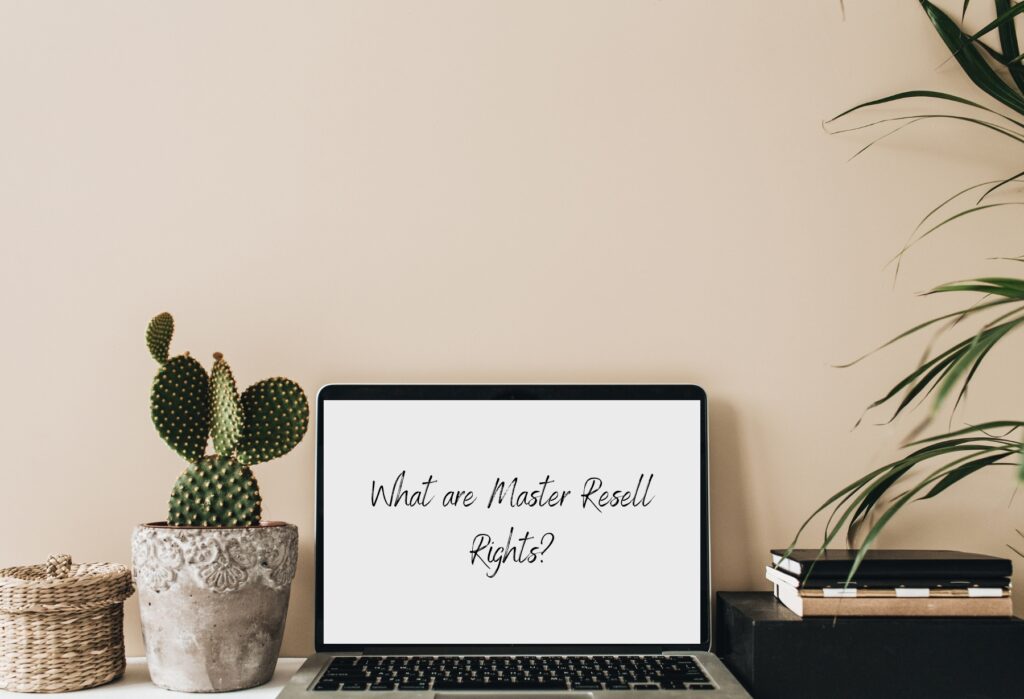When I first stumbled across the term Master Resell Rights (MRR), I imagined a treasure chest of digital products ready for me to sell, and that’s not far off the mark! MRR is a license that comes with certain digital products, granting you the power to sell these products as if they were my own creation. The best part? You get to keep 100% of the profits.
It feels a bit like being handed the keys to a shop with no overhead costs. You buy a digital product with MRR — say an e-book or a software — and can set up your own digital shop instantly. What makes it really interesting is that the license often allows the buyer to pass on the resell rights. So, not only do you earn from selling the product, but your customers can also sell it onward, creating a potential cascade of digital entrepreneurship.
It’s worth noting that each MRR agreement has its own set of rules which you must follow. It’s crucial to read the fine print — just as you would for any other contract — so you don’t unintentionally step over any legal boundaries.
Understanding Resell Rights
Before we dive into the nitty-gritty, let me give you a head’s up: Resell rights are your golden ticket to distributing content without creating it from scratch. But like any ticket, they come with terms and conditions.
Exploring Different Types of Resell Rights
You’ll often see three main flavors of resell rights in the digital playground:
- Basic Resell Rights (RR): You buy a product once and sell it multiple times. Simple and sweet. But, you can’t change the product or sell the rights to sell it.
- Master Resell Rights (MRR): This is where things get spicier. Not only can you sell the product, but you also pass on the rights to your customers to sell it further.
- Private Label Rights (PLR): The creative freedom choice. You can tweak, twerk, and rebrand the product as I see fit. Want to put your name on it as if I created it? Go for it!
Legal Foundations of Resell Rights
When I say ‘legal foundations’, I’m talking about the bedrock here:
- Copyright: Even in reselling, someone’s hard work is behind that product, and copyright laws protect their interests. Resell rights are a courtesy extended under specific conditions outlined in a licensing agreement.
- Licensing Agreement: This is the rule book, your guide to what you can and can’t do with the product. It’s legally binding, so treat it like your grandma’s advice—seriously.
Benefits of Master Resell Rights
Pros:
- Profit: With MRR, I find that one of the biggest advantages is the potential for 100% profit on each sale. It’s like buying a cake mix, baking a cake, and selling it over and over again, keeping all the dough—pun absolutely intended.
- Market Reach: Selling a product with MRR can expand your market reach. The buyers can resell the product themselves, which can lead to a wider distribution.
- Quality: While you don’t create the product myself, the quality can still be high if you select MRR products wisely. This ensures customer satisfaction and maintains my reputation in the market.
- Exclusive Content: Some MRR deals come with exclusive content, which can set your offerings apart from basic resale rights.
Challenges and Limitations
Cons:
- Market Saturation: The downside? You may face market saturation since MRR products are not unique to me. This can make it challenging to sell if too many resellers are in the game.
- Quality Control: You don’t control the product changes; hence, your hands are tied if the original product doesn’t meet the quality you desire.
- Reputation: Your reputation could take a hit if the product you’re reselling isn’t up to snuff. You have to trust the original creator’s work, which can be like a blind date with mixed results.
- Licensing Agreements: Sometimes the limitations and specific conditions in the licensing agreements can feel like solving a Rubik’s cube, complex and at times frustrating.
Marketing Strategies for MRR Products
When I sell Master Resell Rights (MRR) products, I focus on maximizing profit and revenue through smart marketing and establishing strong customer relationships. Here’s how I make sure these digital goods fly off the virtual shelves!
Promotion on Digital Platforms
Promoting MRR products means you’ve got to be where my audience hangs out:
- Social Media: Create engaging posts on platforms like TikTok and Instagram to generate buzz and direct traffic to your sales page.
- Blog and Forums: Share helpful content on your blog and contribute to forums to establish myself as a knowledgeable seller. It’s a great way to build authority and get people interested in what you’re selling.
Building Customer Relationships
To me, forming strong relationships with customers is key to long-term success. Here’s what I focus on:
- Email Marketing: I keep in touch with my buyers through thoughtful and personalized email campaigns. It’s not just about selling; it’s about sharing tips and offering value.
- After-Sales Support: I ensure customer satisfaction by being available for questions and offering help when needed. Happy customers come back, and they bring friends!
Incorporating MRR into Business Models
To leverage MRR effectively,make sure the product aligns with your business model. For instance, if you specialize in digital marketing resources, look for high-quality MRR eBooks or tools that your audience would love. I’ve tried them all and put the comparison in this handy guide.
- Digital Product Expansion: List eBooks, software, or courses that match my business theme.
- Customization: Adapt MRR content to fit my online business’s unique voice, adding more value.
- Profit Margins: Since MRR allows for full profits from sales, it can significantly boost overall earnings.
Compliance and Legal Considerations
The excitement of selling MRR products shouldn’t overshadow the need for compliance and understanding copyright law. Always ensure that the MRR license permits the level of customization and resale I’m planning. Additionally, respect copyright law by not infringing upon any protected elements within the product. Sticking to these legal considerations protects you from potential lawsuits and maintains your reputation as a reliable reseller.
Frequently Asked Questions
How do Master Resell Rights differ from Affiliate Marketing?
In MRR, you actually own the product, whereas in affiliate marketing, you’re promoting someone else’s product for a commission. Think of MRR as being a digital product wholesaler versus being a commission-based salesperson in affiliate marketing.
In what ways can Master Resell Rights be profitable for an individual?
MRR lets you buy once and sell many times, pocketing 100% of the profits. It’s like having a goose that lays golden eggs, except it’s perfectly legal and less messy.
Are there legal concerns to be aware of when dealing with Master Resell Rights?
Absolutely, you’ve got to read the fine print. Each MRR product comes with its own set of rules, and not following these can land you in hot water faster than you can say, “refund”.
How does the pricing for Master Resell Rights work?
It’s pretty straightforward: you pay an upfront cost for the MRR license, and then set your own price to sell. Many MRR products come with a minimum allowed price. To go above that price you’ll need to create a bundle and add your own unique services or products.
What advantages do Master Resell Rights offer in the realm of digital marketing?
MRR is a shortcut for you to expand your product line without creating from scratch. It will save you a lot of time and offer valuable learning and community, too.

